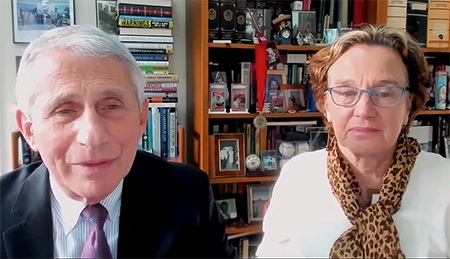by WorldTribune Staff, May 19, 2022
SWAMP WATCH
Christine Grady, who heads up the Department of Bioethics at the National Institutes of Health (NIH) Clinical Center, was one of the authors of a study which not only defended but encouraged corporations to put pressure on employees to get the Covid vaccine and to stigmatize workers who resisted getting the jab.
As it happens, Christine Grady is Anthony Fauci’s wife.

In March, Grady was one of the authors credited on a study titled “The Ethics of Encouraging Employees to Get the COVID‑19 Vaccination” which was bankrolled by the NIH’s Clinical Center and the National Human Genome Research Institute.
The study focuses on the “ethics of encouragement strategies aimed at overcoming vaccine reluctance (which can be due to resistance, hesitance, misinformation, or inertia) to facilitate voluntary employee vaccination.”
In the study, Grady and her three co-authors outline how it is “ethically acceptable” to “subtly pressure employees to get vaccinated”:
“While employment-based vaccine encouragement may raise privacy and autonomy concerns, and though some employers might hesitate to encourage employees to get vaccinated, our analysis suggests ethically acceptable ways to inform, encourage, strongly encourage, incentivize, and even subtly pressure employees to get vaccinated.”
The study was published after attempts by Team Biden, led by Covid czar Fauci, and Democrat politicians across America to mandate the Covid jab for federal and state workers.
The study by Grady and her co-authors advise corporations it can “be ethically appropriate” to press employees to get the shot and to issue “clear articulation about the consequences of not complying with the policy.”
“In that circumstance, employees have a choice between getting vaccinated or accepting the consequences of a choice to remain unvaccinated,” the study says.
Those “consequences” include stigmatizing employees who refuse the vax.
“There can be social consequences associated with peer communication about vaccination, such as stigma and ostracization of those not vaccinated,” the study asserts. “Individuals who choose to make the workplace less safe for others through their vaccine refusal should be able to foresee the possibility of this kind of social consequence,” it continues, appearing to endorse the aforementioned “stigma and ostracization” of individuals unvaccinated against COVID-19.
About . . . . Intelligence . . . . Membership
